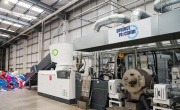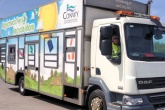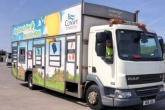Conwy four-weekly refuse collections delayed again
Plans for Conwy County Borough Council (CBC) in Wales to bring in four-weekly residual waste collections by the end of 2019 have been further delayed, apparently due to residents having difficulties getting to grips with the system.
This news comes as the Welsh Government has approved £7.5 million of additional funding for local authorities to boost recycling rates (£103,287 of that going to Conwy).
The plans for a four-weekly system in Conwy, which currently recycles 63 per cent of its municipal waste, have proceeded in a ‘two steps forward, one step back’ manner since a year-long trial began in September 2016. The trial saw a 17 per cent rise in recycling in the 10,900 households involved, alongside a fall in residual waste tonnage of 31 per cent. At the same time, three-weekly collections were rolled out for the rest of the county.
From the magazine: Can four-weekly collections move mountains in Conwy?
After the trial, the council’s Improved Recycling Task & Finish Group recommended the change to a monthly collection be implemented across the county, projecting potential savings of £390,000 a year, but the plan was held up by councillors on the Economy and Place Scrutiny Committee, who voted in November 2017 for a three-weekly scheme for the entire county, expressing concerns that the trial was creating a ‘two-tier system’ for residents.
A number of councillors have also expressed concerns about increased fly-tipping and pests, although there has been no evidence so far that the four-weekly scheme has led to any such increases.
The cabinet gave the green light to the four-weekly plans once more, on 23 January, only to face further delays following a special meeting on 26 February, called in order to discuss additional measures designed to ease the transition to the monthly system.
These potential measures, in line with those recommended by CIWM in a letter to Conwy CBC, include weekly food waste collections, free bulky waste collections, separate nappy collections, additional services at peak periods and a comprehensive communications strategy. At the meeting, councillors discussed these measures and provided recommendations for how these should be implemented before going ahead with a four-weekly system.
Councillors voted 24 to 18 (three abstaining) in favour of the motion: ‘The council asks cabinet to reconsider their resolution of 23 January in respect of introducing four-weekly waste collections until cabinet is wholly satisfied that all education and communication mitigation measures raised at council today are in place.’
‘Education is the main issue’
Welsh Labour councillor Ronnie Hughes, who was in favour of the motion to delay the four-weekly scheme, commented: “Education is the main issue, no doubt about it. If you push people, people are going to push back.”
The council, however, claims that an independent survey of householders found that negative attitudes towards the change have dropped by 15 per cent to 26 per cent following an improved council communications regime.
Jon Eastwood, Conwy’s Waste Manager, told Resource in September that the council has been focusing on communication throughout the trial: “Residents have adapted marvellously but I don’t think you could do this without focusing on communications. It’s a project that’s been communicated to residents for the best part of two years now.”
A recent survey by Better Connected, a service from Socitm (the Society of Information Technology Management) which analyses the digital performance of local authorities, claims that 57 per cent of councils across the UK provide a ‘good or very good online service’ explaining to residents how to put out rubbish for recycling.
Although Conwy received a three star ‘good’ rating from Better Connected, the report states that the county has a high likelihood of digital exclusion, meaning a large number of residents could face difficulties accessing online information about recycling.
The report also drew attention to the range of different services across the country, stating that ‘there appear to be almost as many arrangements as there are councils, with a variety of terms for describing categories of waste’ - something brought up in the government’s 25 Year Environment Plan, which promised to ‘accelerate [a] shift to consistency in the materials collected’.
The Better Connected report calls for all councils to provide simpler explanations to kerbside collection systems, revealing that only 54 per cent of council websites made clear the consequences of putting waste in the wrong container.
The full results of the survey, with individual council reports, can be found on the Better Connected website, while the minutes and report from the special meeting of Conwy councillors are available on the Conwy CBC website.







